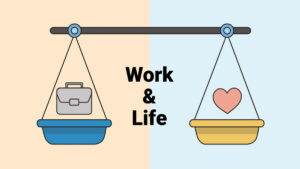In today’s fast-paced world, finding time for wellness while juggling a demanding career can feel impossible. Between long meetings, tight deadlines, and personal responsibilities, self-care often gets pushed to the back burner. But here’s the truth: neglecting your health in the name of productivity is a recipe for burnout.
Balancing work and wellness isn’t about radical lifestyle changes. It’s about integrating small, mindful habits that protect your physical and mental health—even during your busiest weeks. In this article, we’ll guide you through practical strategies to help you thrive both professionally and personally.
Why Work-Life Wellness Balance Matters
The pressure to “do it all” has reached unprecedented levels. According to the American Psychological Association, chronic workplace stress contributes to anxiety, depression, and even physical illness. A balanced lifestyle can improve your focus, energy levels, and long-term productivity.
In other words, taking care of yourself isn’t a luxury—it’s a necessity for sustainable success.
Analyze How You Spend Your Time
The first step to achieving balance is understanding where your time goes. Are you working late into the night, skipping meals, or sacrificing sleep for work?
Let’s take a look at an average week:
As the chart shows, work often dominates our weekly hours, leaving minimal time for wellness. By identifying this imbalance, you can start reallocating time more mindfully.
Set Boundaries with Work
Boundaries are essential to protect your personal time. Start by:
- Establishing Work Hours: Define clear start and end times.
- Unplugging After Work: Turn off notifications when your day ends.
- Communicating Limits: Let colleagues know when you’re unavailable.
These practices prevent work from bleeding into your evenings and weekends, allowing your mind to rest and recharge.
Schedule Wellness Like a Meeting
If it’s not on your calendar, it likely won’t happen. Treat wellness activities—like workouts, meal planning, or meditation—as essential appointments.
Here’s how to start:
- Block 30-minute slots for movement or stretching.
- Add time for grocery shopping and prepping healthy meals.
- Schedule a morning or bedtime routine for mindfulness.
Consistency is key. Even 10 minutes of focused self-care daily can improve your overall well-being.
Choose Activities That Replenish You
Wellness doesn’t have to mean a full gym session or spa day. Choose habits that nourish your mind and body:
- Physical: Walking, yoga, dancing, cycling.
- Mental: Reading, journaling, deep breathing.
- Emotional: Connecting with loved ones, practicing gratitude.
Find what makes you feel good and incorporate it regularly—even in small doses.
Optimize Your Environment
Your surroundings can either support or sabotage your wellness goals. Try these environment-friendly tweaks:
- Keep healthy snacks within reach to avoid junk food.
- Use ergonomic furniture to reduce physical strain.
- Add indoor plants or natural light to reduce stress.
- Play calming music or white noise to boost focus.
A workspace that promotes health makes it easier to sustain healthy habits without extra effort.
Frequently Asked Questions (FAQs)
1. How do I find time for wellness with a 9-to-5 job?
Start small—wake up 15 minutes earlier, use breaks to stretch, or wind down with 10 minutes of meditation. Small habits add up.
2. Can wellness improve work productivity?
Yes. Studies show that regular exercise and mindfulness enhance cognitive function, creativity, and decision-making.
3. What if my job doesn’t support work-life balance?
Focus on what you can control. Set personal boundaries and use personal time to recharge. Consider speaking with HR about wellness initiatives.
4. Do I need to work out every day to stay healthy?
Not necessarily. The CDC recommends at least 150 minutes of moderate activity per week. Spread it out in ways that suit your lifestyle.
5. How can I manage stress better during work hours?
Use techniques like box breathing, short walks, or the Pomodoro technique to break up intense work periods and prevent burnout.
Final Thoughts: Start Small, Stay Consistent
Work-life balance isn’t about perfection—it’s about intention. By making wellness a non-negotiable part of your daily routine, you can boost your energy, prevent burnout, and live a healthier, more fulfilling life.
Start with just one change this week. Block time for yourself, protect it fiercely, and build from there. Wellness is the foundation—not the reward—of a successful career.




